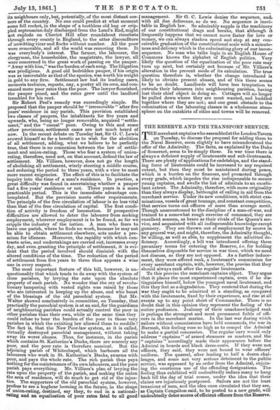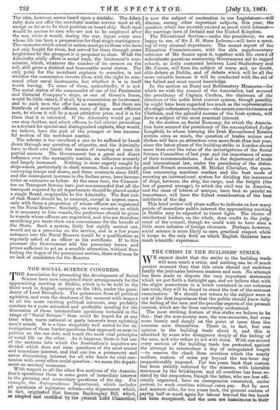THE RESERVE AND THE TRANSPORT SERVICE. T HE merchant captains who
assembled at the London Tavern qn Tuesday, to discuss the proposal for adding them to the Naval Reserve, seem slightly to have misunderstood the offer of the Admiralty. The facts, as explained by the Duke of Somerset, seem to be simply these. In war time there is always a deficient supply of lieutenants and sub-lieutenants. There are plenty of applications for cadetships, and the stand- ing force of lieutenants could be increased to any required extent, but then they must be maintained during peace, which is a burden on the finances, and promoted through every grade, which impedes the rise indispensable to secure young captains, and swells the list of admirals to an exorbi- tant extent. The Admiralty, therefore, with more originality than they always display, bethought of calling in aid from the merchant service. Under its new conditions, with strict exa- minations, vessels of great tonnage, and constant competition, that service turns out officers of more than average merit. Though unaccustomed to the discipline of a man-of-war, and trained to a somewhat rough exercise of command, they are excellent seamen, as brave as their rivals of the Queen's ser- vice, and acquainted with all indispensable knowledge except gunnery. They are thrown out of employment by scores in any general war, and might, therefore, the Admiralty thought, be willing, as well as able, to supplement the admitted de- ficiency. Accordingly, a bill was introduced offering them pecuniary terms for entering the Reserve, i.e. for holding themselves disposable for service in war time, which we need not discuss, as they are not opposed. As a further induce- ment, they were offered rank, a lieutenant's commission for every merchant captain, with, however, the proviso that they should always rank after the regular lieutenants. To this proviso the merchant captains object. They argue that it places the most experienced captain, even if he dis- tinguishes himself, below the youngest naval lieutenant, and this they feel as a degradation. They contend that during the war they ought to be admitted at a standing, as compared with the lieutenants, fixed by their experience, and rise at all events up to any point short of Commander. There is no doubt that in this opinion they represent the feeling of the entire profession. Jealousy of their unacknowledged rank is perhaps the strongest and moat permanent foible of offi- cers in the merchant marine. In the last war during which sailors without commissions have held commands, the war in Burmah, this feeling rose so high as to compel the Admiral to make a partial concession. The regular navy would only address " captains " of armed steamers as masters, and the " captains " accordingly made their appearance before the Admiral in beards and black dress-coats. If they were not officers, they said, they were not bound to wear officers' uniform. The quarrel, after leading to half a dozen chal- lenges, and some not very serious detriment to the public service, was appeased by an order from the Admiral, enjoin- ing the courteous use of the offending designations. The feeling thus exhibited will undoubtedly induce many to hang back till the day of trial comes, under the idea that their claims are injuriously postponed. Sailors are not the least tenacious of men, and the idea once circulated that they are, as Captain Congalton said, to be posted to a new grade, will undoubtedly deter scores of efficient officers from the Reserve. The idea, however, seems based upon a instake. The Adtni- ralty does not offer the merchant marine service rank at all, except so far as to fix their position on board ship. Such rank would be useless to men who are not to be employed after the war, while it would, during the war, injure every man *hose life has been a preparation for that single contingency. The vacancies which occur in action must go tothose who have not only fought for them, but served for them through years brightened by the prospect it is proposed to close. What the Admiralty really offers is social rank, the lieutenant's coin- mission, which, whatever the number of its owners on the roll, still gives a distinct and honourable social status. The only point for the merchant captains to consider, is not Whether the commission invests them with the right to Com- mand other naval lieutenants, but whether it is in itself Worth having. To some of them, undoubtedly, it is not. The social status of the commander of one of the Peninsular and Oriental Company's ships, or one of Green's liners, would be little raised, if at all, by a commission as lieutenant, ditcl to such men the offer has no meaning. But there are Mthdreds of merchant Officers, many of them Most efficient men, to Wholn it will be a most attractive prize, and it is for them that it is intended. If the Admiralty would go just one step further, and admit officers to full service promotion as a reward for special and distinguished exploits, they would, we believe, have the pick of the younger or less success- ful section of the merchant marine.
The schenie is too excellent a one to be suffered to.break down through any question of etiquette, and the Admiralty have in their own hands the means of ensuring at least its partial success. The Government has a great and direct influence over the mercantile marine, an influence recently and largely increased. Nothing is more eagerly sought by shipowners, particularly in slack seasons, than a contract for conveying troops and stores, and these contracts since 1857, and the consequent increase in the Indian army, have become twice as extensive as before. At the same time, the Commit- tee on Transport Service have just recommended that all the transport required by all departments should be placed under a single 'Board, responsible to the Admiralty. The first rule of that Board should be, to contract, except in urgent cases, only with firms a proportion of whose officers are registered on the Naval Reserve. Similarly, on every occasion on which it is necessary to hire vessels, the preference should be given to vessels whose officers are registered, and who are therefore sacrificing pro Mato their own convenience for the benefit of the State. Such a system, fairly but rigidly carried out, would act as a premium on the service, and in a few years entrance into the Naval Reserve would be a qualification as regularly asked of an officer as his certificate. If to this pressure the Government add fair .pecuniary terms, and prizes sufficient to act as a sensible attraction, without frus- trating the hopes of the permanent service, there will soon be no lack of candidates for the Reserve.































 Previous page
Previous page